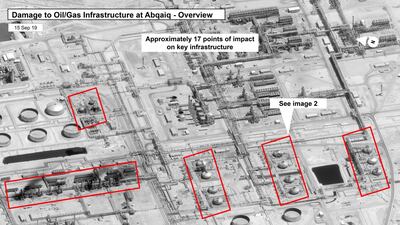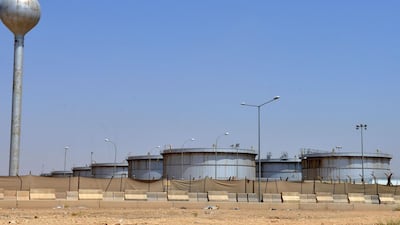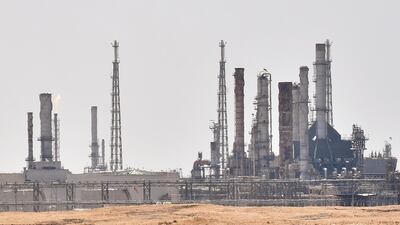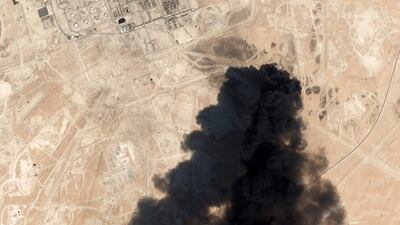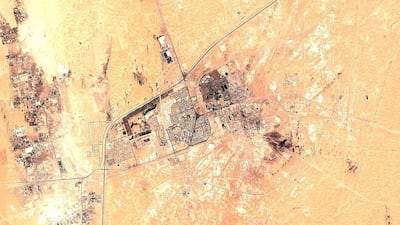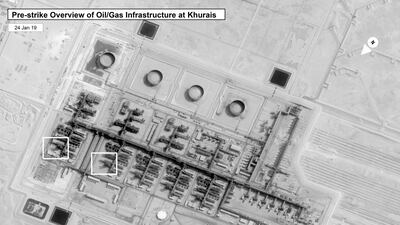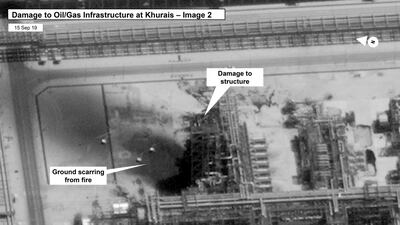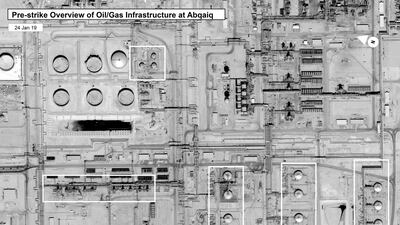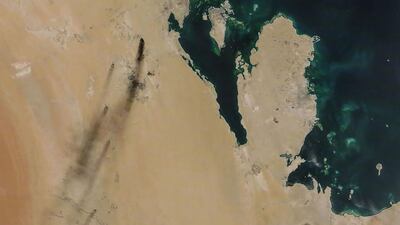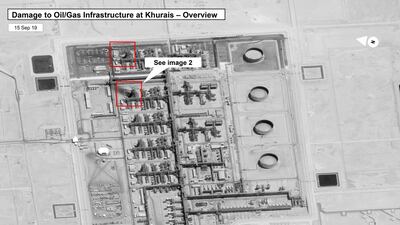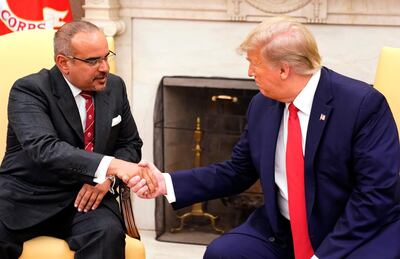US President Donald Trump announced on Monday will send his Secretary of State, Mike Pompeo, to Saudi Arabia after the attacks on two Aramco oil centres.
Mr Trump announced that Mr Pompeo and other senior administration officials would travel soon to Riyadh.
Mr Trump and Defence Secretary Mark Esper spoke with Saudi Crown Prince Mohammed bin Salman over the weekend.
The president said early indications were that Iran was responsible for the attacks.
“Well, it’s looking that way," Mr Trump said. "We’ll let you know definitively. "That’s being checked out right now."
Mr Trump hosted Bahrain's Crown Prince Salman bin Hamad Isa Al Khalifa in the White House where they discussed the attacks on Saudi and maritime security. Bahrain will be hosting a US-led maritime security conference to counter Iran's destabilising activities in the Gulf this Fall.
The president appeared to be backing down on some of his tweets on Sunday night about the attacks when he threatened that US assets are "locked and loaded".
When asked about war with Iran, Mr Trump said "I don't want war with anybody. I'm somebody that would like not to have war." He added that the US is not in a hurry to respond and would need to find out who's behind the attack.
But when asked if a lethal US military strike be proportional to an Iranian one on an oil facility, Mr Trump said “I think that it would.”
The US planned to release more evidence pointing to Iran as the perpetrator of the attacks but could allow Saudi Arabia to decide the level of response, experts say.
The National Security Council reviewed the evidence and discussed US options as it met at the White House for a second day on Monday, a US official told The National.
Mr Pompeo is reportedly planning to release more evidence that points to Iran’s culpability.
Senior official said the US had intelligence indicating that Saturday’s attacks came from Iran and not Yemen or Iraq, media reported on Monday.
"Iran was the staging ground for a debilitating attack on Saudi Arabia's oil industry, and the US has shared the information with Saudi Arabia as both countries weigh retaliatory strikes," The Wall Street Journal reported.
“Iran launched nearly a dozen cruise missiles and over 20 drones from its territory” in the attacks, ABC quoted a senior official as saying.
On Twitter, Mr Trump rebutted Iran’s denials about the attacks.
“Remember when Iran shot down a drone, saying knowingly that it was in their airspace when, in fact, it was nowhere close?" he posted.
"They stuck strongly to that story knowing that it was a very big lie. Now they say that they had nothing to do with the attack on Saudi Arabia. We’ll see.”
Suzanne Maloney, deputy director at the Brookings Institution, said “the most urgent priority is for the United States to establish a credible case around the origins of the attack”.
"This is critical not simply for devising an effective response and ensuring robust co-ordination with allies and partners, but also for reinforcing deterrence against any future attacks," Ms Maloney told The National.
She said deterrence “has to be foremost for Riyadh, as well as for reassuring markets”.
Ms Maloney doubted that Mr Trump's response would involve the US military.
“President Trump has proven more inclined towards combative tweets than towards initiating actual military action, especially in the Middle East," she said.
“He has powerful disincentives that may mitigate against escalation in the form of public opinion and electoral politics.”
Ryan Bohl, of the intelligence firm Stratfor, said the US was leaving it to Saudi Arabia to decide the level of response.
“Since a potential retaliation from Iran would hit the Gulf states the hardest, the White House is letting the Gulf states define the outlines of the policy,” Mr Bohl said.
He said the options for the US and Saudi Arabia range from cyber attacks similar to the one carried out in June after Iran shot down a US drone, to increasing shared intelligence and sending more military to the kingdom to deter further attacks.
“Missile strikes on regional Iranian assets or targets involved in the attacks is also on the table,” Mr Bohl said.
But he said that for any US response there had to be regional involvement, because Mr Trump did not want “American fingerprints all over the case”.
